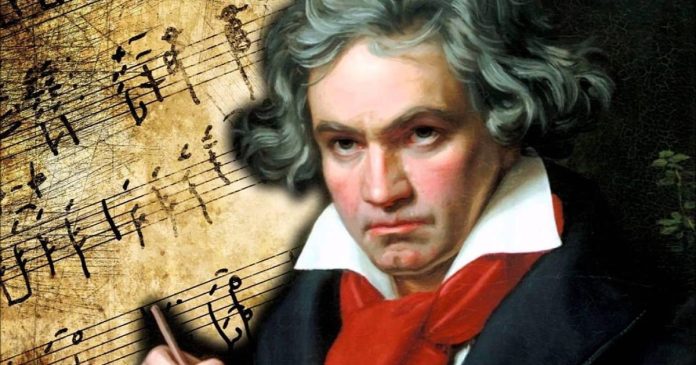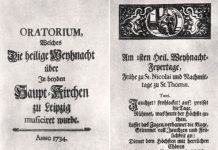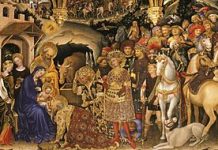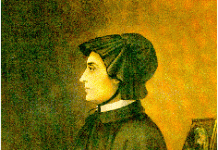Beethoven was baptized a Catholic on December 17th, 1770 – in the time of Advent we now find ourselves, in the proximate preparation for the birth of our Saviour. Those who think that he was not a true Catholic often point to the observation of his friends that he hardly ever attended Mass. Born in the so-called Age of Reason, he very likely was infected with the newfound liberalism promoted by the French Revolution and its resulting spread of rebellion against all the old institutions and ideologies. Indeed, Beethoven apparently admired the same Voltaire that Mozart had described as a “godless arch-scoundrel.”
Beethoven’s character traits attest to a soul conscious of its own greatness, but just as conscious of the littleness of other souls around him. The common complaint of those who knew him well was his mercurial nature, an unpredictable pattern of pompous arrogance and charming fellowship. Yet those who perceived the proof of Beethoven’s dark side, such as the waiter into whose face he threw a dish of gravy, or the prince at whose home he was denied a seat near the host … whereupon he stormed out of the room … were rewarded in some small measure just by the fact that their existence would be recorded for posterity. The impatient and angry temperament that bedeviled not only Beethoven, but all who knew him, was possibly heightened by the growing loss of his hearing. How tragic it must have been for the creator of so much immortal music to have been deprived of the pleasure of hearing his music played. He could hear the tones in his mind, but that which God had given with one hand, He had taken away with the other.
So many young men, full of their own greatness, will find little room for the Catholic God in their lives. That Beethoven was, for much of his life, such a man hardly anyone will dispute. But if his works are carefully studied, there can be no doubt that Beethoven was searching for some Power greater than himself, and that he was preoccupied with absorbing that distant and awesome Power into his music. It is not surprising that in his youth, and increasingly in later years, he referred to God as the “Almighty.” Musical composition, then, became Beethoven’s daily Mass. He communed daily with the omnipotent God through his piano.
Perhaps Beethoven’s passionate search for the Almighty through his musical art could be summarized in these lines of Elizabeth Barrett Browning:
What is art
But life upon the larger scale, the higher,
When, graduating up in a spiral line
Of still expanding and ascending gyres,
It pushes toward the intense significance
Of all things, hungry for the Infinite?
What moods would most of us attribute to Beethoven’s best work? Sadness? Anger? Meditation? Devotion? Joy? But always we feel that Beethoven lifts us beyond ourselves to a higher reality, as he says when he adopts the poet Schiller’s words for the choral movement of his stupendous Ninth Symphony:
Brothers, beyond you a starry canopy, there must dwell a loving Father!
Like Mozart, Beethoven wrote music for the Church. The Missa Solemnis (Solemn Mass) is arguably his best effort in that genre, even though it is more operatic than liturgical. Of this Mass Beethoven said, “My chief aim was to awaken and permanently instill religious feelings not only in the singers but also into the listeners.” The care that Beethoven put into this magnum opus was so great that what he intended to compose in six months took nearly four years. Though the Mass was written on paper of excellent quality, at one point he erased a passage so many times that he wore a hole in it. In the Dona nobis pacem section of the Mass Beethoven had written the heading “a prayer for inner and outer peace.” Many storm clouds had passed over his life: the tragic loss of his hearing; ingratitude of the nephew he loved; quarrelsome dealings with music publishers; failed relations with women; an unknown “incurable” disease; and at last, the painful dropsy.
But finally the peace for which he prayed came to him. On his deathbed Beethoven was asked by a friend whether he would like to see a priest. With a calm expression on his face, he said, “Let the priest be called.” He had stayed clear of priests as much as he could, even though he had often urged his nephew to attend confession. But as if to help Beethoven make up for all the Sundays he had missed church, nine priests officiated at his funeral Mass.
He once wrote what we may rightly call his own epitaph: “… what I am, I am by myself. There are and will be a thousand princes; there is only one Beethoven.”
From the Pen of Beethoven
I despise a world which does not feel that music is a higher revelation than all wisdom and philosophy.
Music should strike fire from the heart of man, and bring tears from the eyes of woman.
Music is the mediator between the spiritual and the sensual life.
Nothing is more intolerable than to have to admit to yourself your own errors.
Music is the one incorporeal entrance into the higher world of knowledge which comprehends mankind but which mankind cannot comprehend.
No friend have I. I must live by myself alone; but I know well that God is nearer to me than others in my art, so I will walk fearlessly with Him.
Recommend virtue to your children; it alone, not money, can make them happy. I speak from experience.
Anyone who tells a lie has not a pure heart, and cannot make a good soup.
My misfortune is doubly painful to me because it will result in my being misunderstood. For me there can be no recreation in the company of others, no intelligent conversation, no exchange of information with peers; only the most pressing needs can make me venture into society. I am obliged to live like an outcast.
Perhaps the quote just given is best musically demonstrated in the profound sadness of the so-called Moonlight Sonata as performed here: Beethoven “Moonlight Sonata” (1 mvt.) by Claudio Arrau











